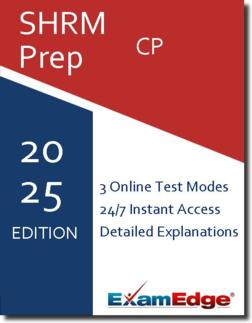SHRM CP (SHRM-CP) Practice Tests & Test Prep by Exam Edge - Test Reviews
Based on 40 Reviews
- Real Exam Simulation: Timed questions and matching content build comfort for your SHRM CP test day.
- Instant, 24/7 Access: Web-based SHRM Certified Professional practice exams with no software needed.
- Clear Explanations: Step-by-step answers and explanations for your SHRM exam to strengthen understanding.
- Boosted Confidence: Reduces anxiety and improves test-taking skills to ace your SHRM Certified Professional (SHRM-CP).

SHRM CP (SHRM-CP) Practice Tests & Test Prep by Exam Edge - Review
SHRM Certified Professional - Reviews
Excellent
Based on
200
reviews
“ I used the practice tests on ExamEdge to prepare for the SHRM-CP exam and passed on my first attempt. The practice tests were a great studying tool that I would highly recommend for anyone preparing for the SHRM-CP exam.
Jeff, Lenawee County, Michigan
“ I purchased practice exams because I was nervous about taking the SHRM-CP exam for the first time. I had heard most people don't pass it on the first try. The practice tests were comprehensive and well-worth the cost. Some of them were actually more difficult than the actual test. After using these ...
Read More
Taylor, B, Rio Rancho, NM
“ I am thoroughly impressed and have already referred 3 of my colleagues who want to use your practice exams! I was a little skeptical because SHRM seems to be one of the only places with full comprehensive practice exams (they are very pricey), but you guys did a phenomenal job mirroring the content ...
Read More
Jake , Brownsville, TN
“ I passed my SPHR and my SHRM-SCP in a 48 hour window. I couldn’t have done it without Exam Edge! The practice tests were right on and helped me get disciplined in the way the questions were structured. I’m so grateful I found Exam Edge! Thank you!
Jenn , Minneapolis, Minnesota
“ I would not have passed my exam without Exam Edge! The practice exams were comprehensive and prepared me well for the exam and the testing environment. I will definitely use Exam Edge for any other tests that I take, and will recommend Exam Edge to my colleagues!
Erika , Wilmington, NC
“ I recently purchased your practice tests prior to taking the SHRM-SCP and it helped me prepare and pass the exam. Thank you for your great service. I had previously only used the SHRM tools and they were not as helpful as the practice exams you offer for a fraction of the price.
Rosalie , Collin County, Texas
“ I purchased the 5 study test package for the SHRM-SCP certification. I forgot that I had scheduled the test and was completely unprepared. I purchased the study tests with less than a week to prepare while juggling full-time work and an executive MBA program. I only utilized Exam Edge's practice tes ...
Read More
Alexis , Brownsville, TN
See why our users from 154 countries love us for their exam prep! Including 40 reviews for the SHRM CP exam.
Exam Edge is an Industry Leader in Online Test Prep. We work with our Institutional Partners to offer a wide array of practice tests that will help you prepare for your big exam. No Matter how niche field of interest might be, were here to help you prepare for your test day.
| 2.8M | 4.5M | |
| Users | Tests Taken | |
| 100K | 19 | |
| Unique Exams | Years in Business | |


